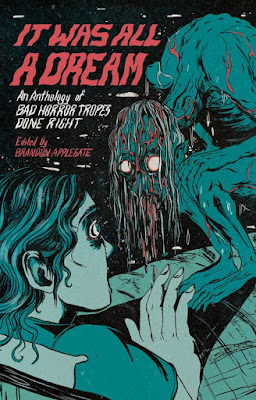Brandon Applegate (ed.), It Was All a Dream: An Anthology of Bad Horror Tropes Done Right. Hungry Shadow Press, 2020. Pp. 338. ISBN 979-8-986920-20-7. $16.98.
Reviewed by Gwen C. Katz
 When Hungry Shadow Press announced It Was All a Dream, I was immediately curious and a bit puzzled. The foremost question in my mind: What does it mean to do a trope right? There are many possible answers to this question, and It Was All a Dream showcases all of them. The stories in this anthology fall into four categories: Parodies, metanarratives, inversions, and stories that are played straight. Quite an assortment!
When Hungry Shadow Press announced It Was All a Dream, I was immediately curious and a bit puzzled. The foremost question in my mind: What does it mean to do a trope right? There are many possible answers to this question, and It Was All a Dream showcases all of them. The stories in this anthology fall into four categories: Parodies, metanarratives, inversions, and stories that are played straight. Quite an assortment!

 I am acutely aware that I approach every book I read weighed-down by the baggage of my history. That load was particularly burdensome as I read the excellent Barzakh: The Land In-Between by Moussa Ould Ebnou. My exposure to African literature is woefully inadequate, so I can’t place this book anywhere within that tradition. I can’t tell you how it stacks up against contemporary African literature, or the African literature of the past. I can tell that my unfamiliarity with Africa as a literary tradition and as a geographic region heightened the sense of strangeness and other-ness I felt while reading. In many ways, that actually impacted my experience with this novel for the better. Readers who are more familiar with these traditions are sure to appreciate what they find in this story.
I am acutely aware that I approach every book I read weighed-down by the baggage of my history. That load was particularly burdensome as I read the excellent Barzakh: The Land In-Between by Moussa Ould Ebnou. My exposure to African literature is woefully inadequate, so I can’t place this book anywhere within that tradition. I can’t tell you how it stacks up against contemporary African literature, or the African literature of the past. I can tell that my unfamiliarity with Africa as a literary tradition and as a geographic region heightened the sense of strangeness and other-ness I felt while reading. In many ways, that actually impacted my experience with this novel for the better. Readers who are more familiar with these traditions are sure to appreciate what they find in this story. When I first encountered the work of adrienne marie brown, it was through her book, Emergent Strategy. That book showed me a gap in my existence and began the process of filling it in. brown introduced to me the concept of moving through systems in nonlinear and creative ways with whole minds, bodies, and communities. She embraces this perspective again in her new release, Fables and Spells: Collected and New Short Fiction and Poetry. The book is long and complex, ever-shifting like an octopus exploring the environment. It challenges the reader to find a place of relaxed alertness while acknowledging the pain of both change and stagnancy. brown is one of the few writers who makes the reader inescapably aware of the body—not just the reader’s body, but all bodies in space and time and politics. Her work and activism are tender and confident like a practiced lover, alive and breathing.
When I first encountered the work of adrienne marie brown, it was through her book, Emergent Strategy. That book showed me a gap in my existence and began the process of filling it in. brown introduced to me the concept of moving through systems in nonlinear and creative ways with whole minds, bodies, and communities. She embraces this perspective again in her new release, Fables and Spells: Collected and New Short Fiction and Poetry. The book is long and complex, ever-shifting like an octopus exploring the environment. It challenges the reader to find a place of relaxed alertness while acknowledging the pain of both change and stagnancy. brown is one of the few writers who makes the reader inescapably aware of the body—not just the reader’s body, but all bodies in space and time and politics. Her work and activism are tender and confident like a practiced lover, alive and breathing.